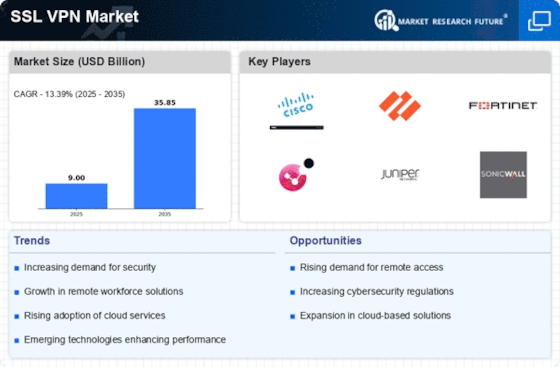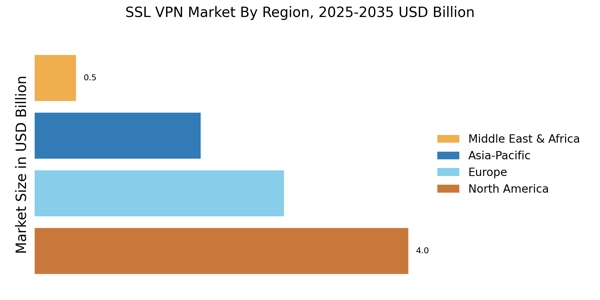Technological Innovations
The Ssl Vpn Market is being significantly influenced by rapid technological advancements. Innovations in cloud computing, artificial intelligence, and machine learning are enhancing the capabilities of SSL VPN solutions, making them more efficient and user-friendly. For instance, the integration of AI-driven analytics allows organizations to monitor network traffic in real-time, identifying potential threats before they escalate. Furthermore, the rise of mobile devices necessitates SSL VPN solutions that can seamlessly support various platforms. As these technologies continue to evolve, the Ssl Vpn Market is expected to expand, driven by the demand for more sophisticated and adaptable security solutions that cater to the needs of modern enterprises.
Rising Remote Work Culture
The shift towards remote work has catalyzed a notable increase in the Ssl Vpn Market. Organizations are increasingly adopting SSL VPN solutions to facilitate secure access to corporate networks for remote employees. According to recent data, the demand for remote access solutions has surged, with projections indicating a compound annual growth rate of approximately 15% over the next five years. This trend underscores the necessity for robust security measures, as businesses seek to protect sensitive information while enabling flexible work arrangements. The Ssl Vpn Market is thus experiencing a transformation, driven by the need for secure, reliable, and user-friendly remote access solutions that can accommodate a diverse workforce.
Growing Cybersecurity Concerns
As cyber threats continue to evolve, the Ssl Vpn Market is witnessing heightened demand for advanced security solutions. Organizations are increasingly aware of the vulnerabilities associated with remote access, prompting investments in SSL VPN technologies that offer enhanced encryption and authentication features. Recent statistics suggest that cyberattacks have increased by over 30% in the past year, leading to a greater emphasis on securing data in transit. Consequently, businesses are prioritizing SSL VPN solutions to mitigate risks and ensure compliance with regulatory standards. This growing concern for cybersecurity is likely to propel the Ssl Vpn Market forward, as companies seek to safeguard their digital assets against potential breaches.
Regulatory Compliance Requirements
The increasing complexity of regulatory frameworks is shaping the Ssl Vpn Market. Organizations are compelled to comply with various data protection regulations, such as GDPR and HIPAA, which mandate stringent security measures for data access and transmission. As a result, businesses are turning to SSL VPN solutions to ensure compliance and protect sensitive information from unauthorized access. Recent surveys indicate that over 60% of organizations view compliance as a primary driver for adopting SSL VPN technologies. This trend highlights the critical role of regulatory requirements in influencing the Ssl Vpn Market, as companies seek to align their security practices with legal obligations while maintaining operational efficiency.
Expansion of E-commerce and Digital Services
The rapid expansion of e-commerce and digital services is contributing to the growth of the Ssl Vpn Market. As more businesses transition to online platforms, the need for secure transactions and data protection becomes paramount. SSL VPN solutions provide a secure channel for online transactions, safeguarding customer information and enhancing trust. Recent data indicates that e-commerce sales have increased by over 20% in the past year, further emphasizing the necessity for robust security measures. Consequently, organizations are increasingly investing in SSL VPN technologies to protect their digital assets and ensure a secure online experience for customers. This trend is likely to drive the Ssl Vpn Market as businesses prioritize security in their digital transformation efforts.

















